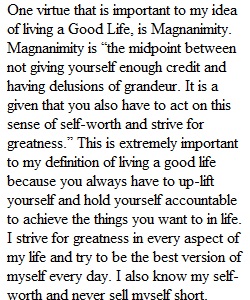


Q Directions 1. Read over the descriptions of Aristotle's twelve virtues below. You may also want to review the "Table of Virtues and Vices" on the "What is a Good Life?" page to see the sphere of action and feeling, the excess, the mean, and the deficiency associated with your selected virtues. 2. Select the TWO virtues that are most important to your idea of living a Good Life. Write a paragraph that identifies these TWO virtues and explains the reason(s) for your choices. (responses should be at least 8-10+ sentences) - (10 points) 3. Select the TWO virtues that are least important to your idea of living a Good Life. Write a paragraph that identifies these TWO virtues and explain the reason(s) for your choices. (responses should be at least 8-10+ sentences) - (10 points) NOTE: For the purposes of this activity, we will assume that although our individual definitions of happiness may vary, the overall goal guiding our idea of a "good life" here is to be happy, to experience happiness, and to maximize happiness and well-being. ________________________________________ Which of Aristotle's twelve VIRTUES fit into your idea of a Good Life? • COURAGE: "The midpoint between cowardice and recklessness. The courageous person is aware of the danger but goes in any way." • TEMPERANCE: "The virtue between overindulgence and insensitivity. Aristotle would view the person who never drinks just as harshly as the one who drinks too much." • LIBERALITY: "The virtue of charity, this is the golden mean between miserliness and giving more than you can afford." • MAGNIFICENCE: "The virtue of living extravagantly. It rests between stinginess and vulgarity. Aristotle sees no reason to be ascetic but also warns against being flashy." • MAGNANIMITY: "The virtue relating to pride, it is the midpoint between not giving yourself enough credit and having delusions of grandeur. It is a given that you also have to act on this sense of self-worth and strive for greatness." • PROPER AMBITION: "This virtue is similar to pride but pertains to smaller honors. There was no name for this virtue in Greek, and in English we use the same word both for the virtue and for the vice of excess;" it is the midpoint between too much ambition and a lack of ambition. • PATIENCE: "This is the virtue that controls your temper. The patient person must neither get too angry nor fail to get angry when they should." • TRUTHFULNESS: "The virtue of honesty. Aristotle places it between the vices of habitual lying and being tactless or boastful." • WITTINESS: "At the midpoint between buffoonery and boorishness, this is the virtue of a good sense of humor." • FRIENDLINESS: "While being friendly might not seem like a moral virtue, Aristotle claims friendship is a vital part of a life well lived. This virtue lies between not being friendly at all and being too friendly towards too many people." • MODESTY: "The midpoint between being too shy and being shameless. The person who has the right amount of shame will understand when they have committed a social or moral error but won’t be too fearful not to risk them." • RIGHTEOUS INDIGNATION: "The virtue of dealing fairly with others. It lies between selfishness and selflessness. This virtue can also be applied in different situations and has a whole chapter dedicated to the various forms it can take" ________________________________________ Sources for all virtues, except "Proper Ambition:" Hendricks, Scotty. "How to be Happy: Aristotle's Guidelines for a Good Life." Big Think, 21 May 2018, https://bigthink.com/personal-growth/aristotles-11-guidelines-for-living-a-good-life/. Source for "Proper Ambition": "Aristotle's Ethics." 3 June 2019. https://faculty.mtsac.edu/cmcgruder/aristitlesethicsvandv.html. PreviousNext
View Related Questions